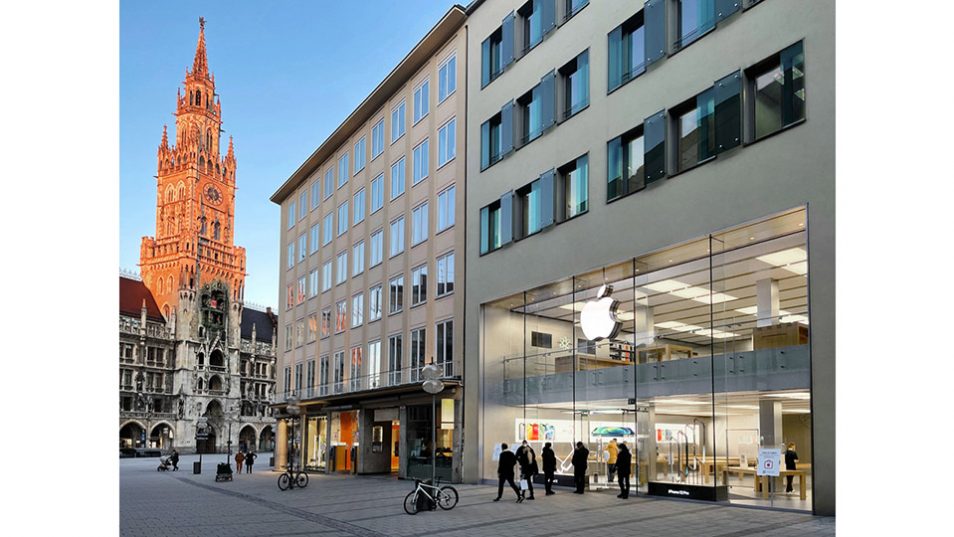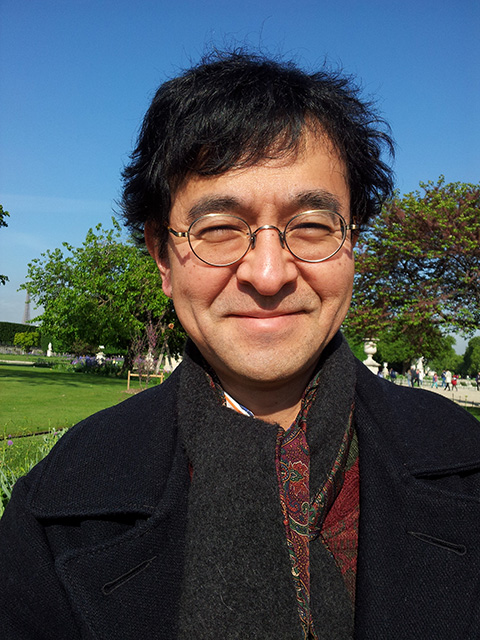Munich – Germany’s Silicon Valley A former beer brewery is now a development center for special semiconductors
 © 2021 Apple Inc.
© 2021 Apple Inc.
October 22, 2021
[by Toru Kumagai]
Munich, the capital of the southern German state of Bavaria (Bayern), has become home to a cluster of information technology (IT) companies. US-American high-tech companies like Apple, Google, and IBM have established bases of operation here, and are working to expand them. They have been doing so because Bavaria is home to numerous manufacturing and IT companies, and has a rich “knowledge infrastructure” thanks to the presence of numerous universities and research institutions.
Apple to Build Semiconductor Development Centre in Munich
On March 10, 2021, Apple announced that it would make Munich its largest design centre in Europe for special semiconductors. Apple said it would invest approximately one billion euros (roughly ¥1.3 billion, at €1 = ¥130) to create a facility on a 30,000-square meter site that would employ some 1,500 engineers from 40 countries. The chosen location is in the Karlstrasse district, close to Munich’s central train station. The location was once the site of the Spatenbräu brewery and is now being transformed into a 21st century centre for the development of cutting-edge technologies.
At this site, Apple plans to develop the semiconductors and other technologies that will be needed to implement the fifth generation technology standard for broadband cellular networks (5G). In 2015, Apple already established its Bavarian Design Center in the region for developing the special semiconductors used in its iPhone, iPad, and Apple Watch products. The company already employs some 350 engineers in the region, and with this project it will greatly expand its base here for developing semiconductors.
The author of this article is personally acquainted with an Indian national who is involved in developing smartphone semiconductors at the Bavarian Design Center. He is an engineer who was headhunted from Samsung, and even though he cannot speak a word of German, Munich has been his base while he travels around the world for business. Given how he talks about traveling to Israel every month, you can sense how connected Munich is to the high-tech powerhouse that is Israel today.
Google also plans to create a new development office in Arnulfstrasse – likewise near Munich’s central train station – by 2023, using the “Postpalast”, a building that was a small parcel depot of Deutsche Post, a postal company. Google already had a base of operations in Munich, but once the new site is completed it will greatly expand the size of its workforce. The site of Google’s new office will cover some 50,000 m2. The 1,500-plus Google engineers slated to work here will be involved in research and development on Chrome and other software products.
Not to be outdone, the US-American IT giant IBM has established the IBM Watson Center Munich in 2017 for research on the artificial intelligence system. IBM here has been going beyond research into Internet of Things (IoT) technologies that employ Watson to develop and market solutions that meet the needs of its respective corporate customers. With the centre’s opening, IBM also increased the number of engineers it employed in Munich from 300 to around 1,000.
And then there are Microsoft which has set up its German headquarters here in Munich, and China’s Huawei which has opened a research centre of its own in the city. To cap it off, Amazon also has moved into a large facility on the north side of Munich in 2020.
A City with a Solid Knowledge-Based Infrastructure
Why is it that major US IT players have been setting up their bases of operation in Munich? One reason for this is that it is the home of numerous strong research institutions, including the Technical University of Munich (TUM), the Ludwig Maximilian University of Munich (LMU), the Hochschule München (a university of applied sciences), the Bundeswehr University Munich of the German armed forces, and one of the Fraunhofer Institutes. As a result, Munich has an abundance of human resources in the field of information technology. Companies can draw from a highly educated workforce: the share of employees with at least a high school education stands at 37.1% versus 33.6% for Stuttgart, 30.8% for Frankfurt, and 28.9% Berlin, among other German cities.
One of the unique features of Munich is the presence of a large number of non-Germans with a higher education who have special skills or professional expertise. University and high school students in Munich are estimated to number around 130,000, some 28,000 (20.9%) of these come from outside of Germany.
Noteworthy is the initiative “UnternehmerTUM” by the Technical University of Munich, a project aimed at supporting currently enrolled students who have developed new technologies in their efforts to launch new businesses. Launched with corporate funding in 2002, the project has seen its 300 or so staffers give advice to students on starting their own businesses, resulting in the creation of an average of 50 start-ups every year.
Manufacturers and IT Companies Creating a Cluster
Another element that has attracted many US-American IT companies is the fact that thanks to support from the Munich and Bavarian governments, the region has turned into an important hub for manufacturing and information technology, with numerous German companies establishing themselves here as well. For example, Munich is home to Siemens, Europe’s largest technology company, and other major manufacturers such as the automobile company BMW. Another automobile manufacturer, Audi, is headquartered not far away in the town of Ingolstadt. Infineon Technology, Germany’s largest semiconductor manufacturer, is also headquartered in the outskirts of Munich. Siemens has been expanding its digital division and has been placing greater emphasis on IoT-related projects such as its smart factory initiative. As for Japanese companies, NTT DATA Deutschland is headquartered in München.
Munich has other factors that work in its favor. It is home to the second largest international airport in terms of passenger volume in Germany after Frankfurt, and it also has excellent transportation access in terms of highways and railroads.
Some businesspeople narrate that one of the reasons that companies like Apple and Google have expanded their presence in Munich is because this facilitates their opportunities to collaborate with automobile manufacturers. The advancement of digital mobility in the form of self-driving vehicles and “connected” cars is more complex and more expensive than it was to develop electric vehicles. The proximity to the headquarters of the German automobile manufacturers facilitates collaboration and reduces costs.
Currently, carmakers around the world are suffering from a severe shortage of semiconductor while demand for specialized semiconductors is growing further. This may be one of the reasons why Apple has invested so much money in creating a major semiconductor design centre in Munich.
There are also the cheaper labor costs. The compensation paid to engineers in Germany is much lower than what American IT companies pay their engineers in Silicon Valley. At the same time, the excellent working conditions in Germany, for example 30 days paid leave and a limit of a maximum of 10 hours of work per day are attracting international talents to come to Munich.
The policies to support and promote the civilian economy that the Bavarian government has implemented since World War II has created a mixed cluster of manufacturing industries and IT business in what was once an agrarian region, and they spectacularly continue to flourish. Given the attractiveness of the region, it doesn’t seem far-fetched to expert more companies to make their way to Munich and Bavaria.
Click here to read other articles from the series “Toru Kumagai’s report on R&D trends in Germany”.

About Toru Kumagai
Born in Tokyo in 1959, Kumagai graduated from the Department of Political Science and Economics at Waseda University in 1982 and joined Japan Broadcasting Corporation (NHK), where he gained a wealth of experience in domestic reporting and overseas assignments. After NHK, he has lived and worked as a journalist in Munich, Germany, since 1990. He has published more than 20 books on Germany and Germany-Japan relations, as well as been to numerous media outlets to report on the situation in Germany.
